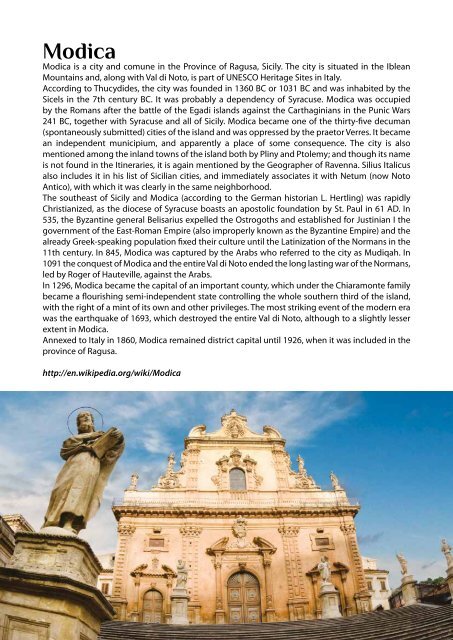Create successful ePaper yourself
Turn your PDF publications into a flip-book with our unique Google optimized e-Paper software.
Modica<br />
Modica is a city and comune in the Province of Ragusa, <strong>Sicily</strong>. The city is situated in the Iblean<br />
Mountains and, along with Val di Noto, is part of UNESCO Heritage Sites in Italy.<br />
According to Thucydides, the city was founded in 1360 BC or 1031 BC and was inhabited by the<br />
Sicels in the 7th century BC. It was probably a dependency of Syracuse. Modica was occupied<br />
by the Romans after the battle of the Egadi islands against the Carthaginians in the Punic Wars<br />
241 BC, together with Syracuse and all of <strong>Sicily</strong>. Modica became one of the thirty-five decuman<br />
(spontaneously submitted) cities of the island and was oppressed by the praetor Verres. It became<br />
an independent municipium, and apparently a place of some consequence. The city is also<br />
mentioned among the inland towns of the island both by Pliny and Ptolemy; and though its name<br />
is not found in the Itineraries, it is again mentioned by the Geographer of Ravenna. Silius Italicus<br />
also includes it in his list of Sicilian cities, and immediately associates it with Netum (now Noto<br />
Antico), with which it was clearly in the same neighborhood.<br />
The southeast of <strong>Sicily</strong> and Modica (according to the German historian L. Hertling) was rapidly<br />
Christianized, as the diocese of Syracuse boasts an apostolic foundation by St. Paul in 61 AD. In<br />
535, the Byzantine general Belisarius expelled the Ostrogoths and established for Justinian I the<br />
government of the East-Roman Empire (also improperly known as the Byzantine Empire) and the<br />
already Greek-speaking population fixed their culture until the Latinization of the Normans in the<br />
11th century. In 845, Modica was captured by the Arabs who referred to the city as Mudiqah. In<br />
1091 the conquest of Modica and the entire Val di Noto ended the long lasting war of the Normans,<br />
led by Roger of Hauteville, against the Arabs.<br />
In 1296, Modica became the capital of an important county, which under the Chiaramonte family<br />
became a flourishing semi-independent state controlling the whole southern third of the island,<br />
with the right of a mint of its own and other privileges. The most striking event of the modern era<br />
was the earthquake of 1693, which destroyed the entire Val di Noto, although to a slightly lesser<br />
extent in Modica.<br />
Annexed to Italy in 1860, Modica remained district capital until 1926, when it was included in the<br />
province of Ragusa.<br />
http://en.wikipedia.org/wiki/Modica


